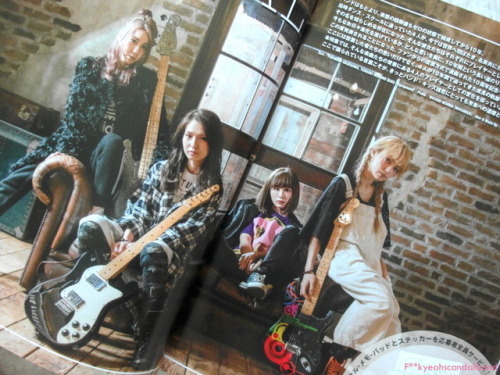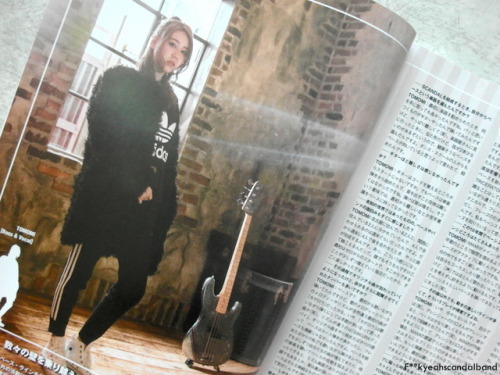SCANDAL; in “GiGS” magazine, Mar 2017 issue - TOMOMI Interview ── When SCANDAL w
SCANDAL; in “GiGS” magazine, Mar 2017 issue - TOMOMI Interview ── When SCANDAL was formed, did you choose to play the bass yourself? TOMOMI: “When we were recommended to play instruments at the start, honestly, anything was fine. The first thing that came to mind was the guitar, which I tried playing, but it was difficult after all (laughs). When we went to the instruments shop to take a look, I was told that there was something that bore a similar shape (to the guitar), but had 2 fewer strings, so I picked it simply. People at the dance school also told me that I’ll do well with the bass, so that’s how I started off.” ── Did you not ever feel that it is more difficult than the guitar? TOMOMI: “Doesn’t playing the guitar begin by remembering guitar chords? However, I started off on the bass by remembering single notes, and it wasn’t actually hard to produce a sound. If you pluck it, there’s sound. In such a sense, I didn’t feel it was hard or that I was poor when I first held onto the bass.” ── Did you feel how interesting the bass and being in a band was, being in a world you had not known of before? TOMOMI: “We’re split 2 and 2 between those who lives in Nagoya, and those who lived in the Kansai region. The only times the 4 of us would meet and play together were during weekends. So when the 4 of us finally get to play together, we’re also finally able to finish up our songs. ‘Ah, so this is how it feels like’. This is true for anyone, but since we really started from zero, I felt that we’ll be able to do more and more by each day, and that was really fun.” ── In that process, you guys got to do more and more original songs, were you also getting more inspired by the members? TOMOMI: “On the bass? At the start, I’d sing as I play, and the first song that had a completely different vocal melody and bass melody was "Kagerou”, I think. Ah no, I thought that “Kagerou” might be a more troubling song for when I sing as I play. The one that has a different rhythm is “SAKURA Goodbye”. We only just started making our own original songs; There were a lot of bass roots, and the phrases weren’t that difficult. It was a level for someone like myself, who’ve just started playing the bass and whom had to sing as I play. But after that, we had even more of our own songs, and after listening to other songs, I got to know the amount of bass riffs that were in them. It’s not only a rhythmic instrument, but also a melodic instrument, and it’s actually quite deep. I realised that the bass isn’t such a simple instrument after all (laughs).“ ── With the bass play in your original songs, the hurdle has gone up. TOMOMI: "Yes, yes (laughs). But as there’s no short cut, I practiced earnestly. By playing the bass, I also got to gradually know the system that I like. I would want to play a certain phrase of a song, so I’ll copy that. That’s how it went, but I think my awareness for bass play increased through it.” ── As your favourite bassist, did you often devote yourself to (learning from) the Red Hot Chili Peppers’ Flea? TOMOMI: “When I had zero idea about the bass at the start, the first thing I watched was Flea’s playing. If you’ll pluck the bass, there’ll be sound, but mine would sound like a cry (laughs). All these ways of playing were shocking. I did have plenty of phrases that I liked, but I didn’t feel like they provided any direct influence. A bass play that I really liked all the way, since I started out on the bass, was TRICERATOPS’ Hayashi Koji’s play. It wasn’t super complicated, but he would play a different rhythm on the bass, while singing another during the chorus, and all of that is very technical. His phrases not only left an impression, but they also brought out a lot. As a bassist myself, I thought of wanting to know more of all kinds of phrases.” ── Surely, as a bassist for 10 years, you’ve met with many challenges right? TOMOMI: “In "Koe”, which MAMI is the main vocalist for, I played a bass phrase actively at the bridge. That was extremely new then for me. Up till that time, I’d be singing along either on the chorus or as the main singer, but in “Koe”, I practically didn’t sing at all, and so, I was able to move as I like, without thinking about having to sing. It was the first time that I was able to play the bass in a bassist-like way (laughs).“ ── Other than that song, there was other songs with lines in which you had to move furiously. You’re good at that, aren’t you? TOMOMI: "Nah, I don’t know about that myself (laughs). If our arranger, Kawaguchi-san arranges it, it does tend to turn out pretty intense on the bass. In the past, I had to practice on that aspect (laughs). When MAMI took to composing songs, and when Kawaguchi-san came in for the arrangement, the rhythmic team would be very intense, as according to MAMI’s wishes, and it’ll be even harsher on the bass (laughs). There’d be more complicated, technical phrases. Even if they might be hard in the beginning, but it was fun slowly getting used to it.” ── As a songwriter, it seems that you gone through a slump about 2 and a half years back. As a bassist, did you not ever go through that? TOMOMI: “Compared to producing, I never had a point where I felt that terrible about myself. However, I did hit walls too. When I was appearing on "Domoto Brothers” (year 2014), I’d be given the score 2 days before the taping. Whenever I see tough scores, although all the musical notes were written down, I’ll be stumped (laughs). Plus, before the taping, Domoto (Tsuyoshi), Shishido Kavka and myself would meet with the audience as the 'Tsuyoshi Man Sisters Band’, where we would do a bit of a funk session. I never did a session before then, so at the beginning, I wasn’t able to play anything besides the same phrase from start to finish. I was rather down then (laughs). So I went back to listen to Flea’s playing once again, and studied the rock phrases by Tower of Power.“ ── After such intense learning, did you feel a sense of release afterwards? TOMOMI: "Well, rather than feeling released, I felt it was more like I got stronger mentally (laughs). I would enter the venue feeling like they were pretty much family, plus, I was alone and didn’t have all the members of SCANDAL with me. In the beginning, I was very careful, but after half a year passed, I was able to better read the scores gradually, and for our last episode, we did about 17 songs in the style of a live (concert). Still, when I got the score 2 days before, I did think it was insane (laughs), but I also felt that I’ll just do the best I can and my heart felt stronger. From then on, whatever happened, I was no longer as scared. Although I don’t remember if it was my playing that got better or what it was.” ── In these 10 years, you’ve also gotten much attention as a lyricist. You performed shockingly during the earlier days, and was praised for your lyrics just overflowing with personality. TOMOMI: “Thank you very much. However, I’ve been writing lyrics since SCANDAL was formed. I was really happy when I wrote "Switch”. Last time, be it when it was sadness or happiness, I’ll just write these simple feelings down, simply as they are. But for “Switch”, although it was very flat, it obviously moved hearts in its words. Since I wrote this song’s lyrics, I also got to gradually understand the system I like to work with. But when I want to turn more delicate feelings into lyrics, they aren’t exactly write-able material. Be it sadness or fun, aren’t people usually able to tell their feelings at that moment and just write? But whenever I want to record that and turn them into words, my emotions would get all worked up. I’ll say that it’s nothing, but not write them down as notes, and it’s just iffy. That’s why, it’s easier to give birth to flat lyrics naturally.“ ── Do you start off your writing by determining a message you’ll like to convey first? TOMOMI: "That’ll be something recent. During the earlier days, I’ll listen to the tune and just come up with a single word that comes to mind with that sound or melody, then expand from it, as if it were a puzzle, but it wasn’t like the song is being pulled by a certain theme we wished to convey from the start. For the ones who’ve seen the band grow, they’ll know this, so I feel a bit responsible (laughs). I begun to think that we definitely do have things to convey to such people too, so then I’ll write notes and jot down certain things that the members talked about, and make lyrics out of them. It rings true for "HARUKAZE” too. There was another girls band that was formed at the school, around the same period as us, and that was written for those people. Although we talked about standing on the stage together, but it didn’t go as we planned. In the end, the only one that’s still persuing his/her music dream is the vocalist. It’s not just that person, but there are also people who formed bands after looking at us, and towards those who said they look up to us, I thought that I might have things I want to convey to them too, so I turned those thoughts into lyrics.“ Photos and translation by fyscandalband. I’ll be translating the personal setlist portions next~ -- source link
#scandal#scandal band#tomomi ogawa#haruna ono#mami sasazaki#rina suzuki#magazine#translation



